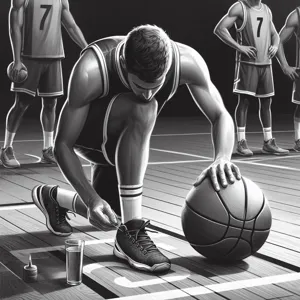Basketball, a game steeped in both athletic prowess and passionate fandom, is not just about skill and strategy; it’s also a world rich with folklore and superstitions.
From the high school courts to the NBA arenas, players and fans alike often find themselves adhering to quirky rituals and beliefs that they trust will bring them good luck or ward off bad fortune. Whether it’s wearing the same pair of lucky socks for every game, performing a specific pre-game routine, or even avoiding certain words or phrases, these superstitions add an intriguing layer to the sport. In this blog post, we’ll delve into the enchanting realm of basketball superstitions—unpacking the origins of these beliefs, exploring the rituals that players swear by, and revealing how these quirky traditions contribute to the game’s mystique. Join us as we bounce through the bizarre and the fascinating, where hoops and hocus pocus collide!
1. Introduction to Basketball Superstitions

Basketball is a game that thrives on precision, skill, and strategy, but for many players, it also dances on the fringes of the mystical and the bizarre. Superstitions in basketball, much like in other sports, provide a unique lens through which we can explore the minds of athletes. These beliefs often shape routines, influence performance, and even dictate game-day rituals. From lucky socks to specific warm-up routines, players often turn to these rituals as a way to channel their focus and gain a psychological edge over their opponents.
The origins of these superstitions can be as diverse as the players themselves. Some stem from cultural traditions, while others emerge from personal experiences or anecdotes shared within locker rooms. Legendary figures in the sport, such as Michael Jordan and Kobe Bryant, have famously embraced their own quirks, turning them into iconic habits that fans and aspiring players alike try to emulate.
As we delve deeper into the world of basketball superstitions, we’ll uncover how these peculiar beliefs not only provide comfort and confidence to players but also become an integral part of the game’s rich tapestry. Whether you’re a die-hard fan, a casual observer, or an aspiring baller, understanding these superstitions can add an extra layer of intrigue to every dribble, dunk, and three-pointer. Join us as we unravel the most common basketball superstitions and discover the enchanting blend of sport and superstition that captivates players and fans around the world.
2. The Origins of Superstitions in Sports
Superstitions in sports are as old as the games themselves, weaving a complex tapestry of belief and tradition that transcends cultures and generations. The origins of these superstitions can be traced back to the very nature of competition—where the unpredictable outcomes of performances can evoke a sense of anxiety and a desire for control. Athletes, coaches, and fans alike often turn to rituals and beliefs to create a sense of predictability in an otherwise chaotic environment.
Historically, many sports superstitions have roots in folklore and ancient customs. For instance, early athletes would often invoke the favor of gods or spirits before competitions, performing rituals meant to ensure victory. In basketball, players might carry on these legacies through personal rituals; a player might wear the same pair of socks or perform a specific shooting routine before every game, believing that these actions will influence their performance and bring good fortune.
Moreover, the psychological aspect of superstitions plays a significant role in their persistence in the world of sports. The human brain is wired to seek patterns and establish connections, even if they are purely coincidental. When a player experiences a particularly good game after wearing their “lucky” jersey or follows a specific warm-up routine, they may unconsciously link that success to their actions, reinforcing the belief in their power. This phenomenon, known as the “illusion of control,” can provide athletes with a psychological edge, boosting their confidence and focus as they step onto the court.
As basketball has evolved, so too have the superstitions surrounding it. From the iconic practice of not stepping on the court’s lines before a game to the belief that certain rituals can ward off bad luck, these traditions continue to shape the culture of the sport. Whether they stem from ancient practices or modern interpretations, the origins of superstitions in basketball serve as a fascinating reflection of the human desire for certainty in the face of uncertainty, reminding us that sometimes, belief can be just as powerful as skill on the court.
3. Common Superstitions Among Players

Basketball is a game steeped in not just athletic prowess but also a rich tapestry of superstitions that players cling to for good luck and performance enhancement. These beliefs, often passed down through generations or forged through personal experiences, add a layer of ritualistic charm to the sport. Here are some of the most common superstitions that players often adhere to:
**1. The Lucky Pair of Socks:** Many players believe that a specific pair of socks can be a game-changer. Whether it’s a particular color or simply the ones worn during a winning streak, players may refuse to wash these socks, fearing that washing them will wash away their luck. The sight of worn-out, faded fabric tells a story of belief and loyalty to that lucky charm.
**2. Pre-Game Rituals:** From a specific warm-up routine to the order in which players put on their gear, these rituals are often repeated as a means of ensuring success. Some players have been known to shoot free throws in a particular sequence, while others might always dribble the ball three times before stepping onto the court. These habits create a sense of control and calm in the chaotic pre-game atmosphere.
**3. The Power of the Headband:** A favorite accessory among many players, headbands are not just a style statement; they are often viewed as a source of strength and confidence. Some players swear by the belief that wearing a headband improves their focus and keeps negative energy at bay. The ritual of putting it on before a game can be as significant as the game itself.
**4. The Game Day Outfit:** What players wear on game day can be a deeply personal choice, often tied to their most successful performances. Whether it’s a specific pair of shoes, a jersey with a lucky number, or even a favorite hat, many athletes find comfort and confidence in their attire. They believe that slipping into these garments channels the energy of past victories.
In the high-pressure environment of competitive basketball, these superstitions provide players with a psychological edge, allowing them to focus on the game while holding onto the comforting belief that fate, or perhaps a little hocus pocus, is on their side. Whether these rituals truly influence performance or are simply a means of coping with the uncertainty of competition, they remain a fascinating aspect of the culture surrounding the sport.
4. Pre-Game Rituals: What Players Do for Luck
In the world of basketball, where the adrenaline runs high and the competition is fierce, players often turn to pre-game rituals as a way to channel their focus and invoke a bit of luck. These rituals can range from the simple to the elaborate, each designed to create a sense of confidence and calm before the storm of a game.
Some players have specific routines that they adhere to with unwavering dedication. For example, you might find a player who insists on wearing their lucky socks—worn and faded, yet imbued with the magic of countless victories. Others may have particular warm-up exercises they perform in a specific order, believing that this sequence will align their body and mind for peak performance.
Many athletes embrace the power of music, curating playlists that pump them up while also serving as a personal soundtrack to their journey to the court. The choice of songs, often steeped in nostalgia or personal significance, can help to create an emotional connection that enhances their mental readiness.
In addition to these individual rituals, some players find strength in group dynamics, participating in team huddles or collective chants that reinforce camaraderie and shared purpose. This collective energy can be incredibly powerful, as it reinforces the bond among teammates and sets a positive tone for the game ahead.
Perhaps one of the most fascinating aspects of pre-game rituals is the psychological comfort they provide. The act of engaging in these routines can serve as a mental anchor, helping players combat nerves and focus their minds. Whether it’s a secret hand gesture, a specific way of lacing up their shoes, or even a particular meal eaten before the game, these rituals are not merely superstitions; they are essential elements of a player’s preparation, helping them to step onto the court with confidence and poise.
Ultimately, while the science behind superstition may be debatable, the impact of these pre-game rituals on a player’s mindset is undeniable. They transform anxiety into excitement, uncertainty into assurance, and help to weave a tapestry of belief that can elevate performance when it matters most.
5. The Role of Jerseys and Numbers in Superstitions

In the world of basketball, superstitions often weave themselves intricately into the fabric of the game, with jerseys and numbers playing a pivotal role in this fascinating tapestry. For many players, a jersey isn’t just a piece of fabric; it’s a talisman imbued with luck, pride, and personal significance. From high school courts to the NBA, athletes frequently believe that certain jerseys can bring them good fortune or enhance their performance. Some players have a specific jersey they refuse to wash, fearing that doing so might wash away their winning streak. Others might insist on wearing a particular jersey on game days, convinced that it channels their best energy and helps them perform at their peak.
Numbers, too, carry profound meanings for players, often steeped in personal history or superstition. The choice of jersey number can be deeply symbolic; it might honor a beloved mentor, a childhood hero, or an important date in a player’s life. Conversely, some players shy away from certain numbers, believing they bring bad luck or are associated with negative experiences. The infamous number 13, for instance, is often avoided in sports, with players opting for alternatives that they perceive as more auspicious.
Moreover, the rituals surrounding jersey numbers can extend beyond the player themselves. Fans often rally behind their favorite players, associating specific numbers with memorable moments or championships. This collective belief can create an atmosphere where numbers take on a legendary status, further solidifying their importance in the superstitious landscape of basketball. In many ways, the rituals surrounding jerseys and numbers reflect a player’s psyche, revealing how intertwined belief and performance can be in the high-stakes environment of basketball. Whether it’s the jersey worn during a championship game or the number that seems to bring a constant stream of victories, these elements of superstition add an intriguing layer to the sport, guiding players as they navigate the highs and lows of their athletic journeys.
6. Game Day Foods: What Players Avoid and Embrace
When it comes to game day, rituals and routines become almost sacred for basketball players. Among the myriad of superstitions that swirl around the sport, dietary choices often take center stage, influencing not just performance but also mindset. Many players have their go-to meals, believing that what they eat can significantly impact their game. For some, it’s a hearty bowl of pasta, rich in carbohydrates for sustained energy. Others might lean towards a light salad or lean protein, aiming to feel agile and quick on their feet.
Conversely, there are foods players consciously avoid. Heavy, greasy meals are often shunned, as they can lead to sluggishness and discomfort during gameplay. Dairy products might be on the no-fly list for some, fearing that they could trigger bloating or affect their agility. Superstitious players might even have specific foods they associate with past victories or losses, choosing to replicate or steer clear of certain dishes based on their previous experiences on the court.
In the world of basketball, game day foods are more than just nutrition; they are rituals that reflect a player’s mental preparedness. Some might even have a pre-game snack that they eat religiously, convinced that it brings them luck. Whether it’s a specific fruit, a particular brand of energy bar, or even a favorite beverage, these choices become intertwined with their performance and mindset. As players embrace or avoid certain foods, they forge a unique connection between what they consume and the magic of the game, making game day meals an essential element of their superstitions.
7. The Power of Lucky Charms and Tokens

In the world of basketball, where the stakes can be high and the pressure palpable, many players turn to lucky charms and tokens as a source of comfort and inspiration. These small objects, often imbued with personal significance, can range from a cherished piece of jewelry to a specific pair of socks worn only during game days. The belief in the power of these items is deeply rooted in the psychology of the sport—players often feel that these tokens can influence their performance and bring them a stroke of good fortune.
Take, for instance, the classic ritual of carrying a lucky coin or a family heirloom into the locker room. Some athletes may rub a small figurine or talisman for good luck before stepping onto the court, while others might insist on using the same ball for warm-ups that they used in their last successful game. These practices can create a sense of routine and familiarity, helping to ease anxiety and boost confidence.
Interestingly, the connection between athletes and their lucky charms often transcends mere superstition. Many players report that the presence of their token serves as a mental anchor, allowing them to focus and channel their energies more effectively. This phenomenon is not unique to basketball; athletes across various sports have their own versions of lucky charms, often sharing stories about the items that have helped them through tough games or significant milestones.
Ultimately, the power of lucky charms and tokens lies not just in their physical presence but in the beliefs and emotions they evoke. Whether it’s the thrill of victory or the agony of defeat, these small items remind players of their journey, their resilience, and the unwavering hope that luck might just be on their side when the final buzzer sounds. As basketball players continue to embrace these cherished tokens, the rituals surrounding them only deepen the mystique and allure of the game.
8. Fan Superstitions: How Supporters Get Involved
When it comes to basketball, the magic doesn’t stop on the court; it extends into the stands where fans weave their own tapestry of superstitions to support their teams. These rituals often become as ingrained in the game as the players themselves. For supporters, the stakes are high, and they believe that their actions can influence the outcome of the game, creating a unique blend of passion and belief that defines the fan experience.
Take, for example, the ritual of wearing lucky jerseys. Many fans have a specific jersey or piece of clothing they wear on game day, often linked to a memorable victory. These garments become talismans, imbued with the hopes and energy of countless games. Some fans even avoid washing these jerseys, fearing that the cleansing might wash away their team’s luck along with the dirt.
Then there are the specific seating arrangements. Some supporters swear that sitting in a particular seat—whether at home or in the arena—can coax a victory. If their team wins while they’re nestled in the same spot, you can bet they’ll be back there for the next game, come rain or shine. Conversely, if the team loses, they may go to great lengths to avoid that seat, convinced that their presence was a bad omen.
The power of snacks and beverages also plays a significant role in fan superstitions. Many fans will have their game-day snacks that must be consumed in a specific order or at a particular time. Some even go as far as to prepare special recipes or drinks that they believe enhance their team’s performance.
Moreover, the rallying cries and chants that echo through the stands are steeped in superstition too. Fans often develop their own chants, believing that specific words or phrases can conjure good luck or intimidate the opposing team. The energy created by these chants can electrify the atmosphere, creating a palpable connection between the players on the court and their supporters in the stands.
Ultimately, these fan superstitions add a layer of mystique to the game, reminding us that basketball is not just about the points scored but also about the collective experience of hope, belief, and unity. In the realm of hoops, every bounce of the ball resonates with the aspirations of supporters, and their superstitions are a testament to the unbreakable bond between fans and their teams.
9. The Psychology Behind Superstitions in Basketball
When it comes to the world of basketball, superstitions often weave their way into the fabric of the game, shaping not only player rituals but also fan behavior. The psychology behind these beliefs is as fascinating as the game itself, revealing a deep-seated need for control and predictability in a sport rife with uncertainty. As athletes step onto the court, they confront a multitude of variables—time on the clock, the skill of their opponents, and the unpredictable bounce of the ball. In such a high-stakes environment, superstitions can serve as a psychological anchor, offering players a sense of control amidst the chaos.
Many players develop personal rituals or beliefs that they adhere to religiously. Whether it’s wearing a particular pair of socks, performing a specific warm-up routine, or even listening to a lucky playlist before a game, these habits often become intertwined with their performance. The act of engaging in these rituals can help alleviate anxiety and build confidence. It’s not just about the actual effectiveness of these behaviors; it’s the belief in their power that can significantly impact performance. When a player feels that they have done everything possible to prepare, they can approach the game with a clearer mind and greater focus.
Moreover, superstitions often serve a communal function as well. Fans are known to don their “lucky” jerseys or chant specific cheers that they believe contribute to the team’s success. This collective belief reinforces a sense of belonging and shared purpose, transforming the experience of watching a game into a ritual in itself. The psychological impact of these shared superstitions can enhance the atmosphere in the arena, creating a palpable energy that players can feed off.
In essence, the intertwining of psychology and superstition in basketball is a testament to the human desire for meaning and control in unpredictable situations. By understanding the motivations behind these rituals, we gain insight not just into the minds of players, but also into the heart of the game itself. Whether they lead to victory or defeat, superstitions remain an indelible part of basketball culture, embodying the blend of hope, belief, and magic that keeps players and fans alike coming back for more.
10. Famous Players and Their Unique Beliefs
Throughout the history of basketball, many legendary players have attributed their success to unique superstitions and rituals that have become part of their identities both on and off the court. These beliefs offer a fascinating glimpse into the minds of athletes who often rely on a combination of skill, strategy, and a sprinkle of the mystical to elevate their performance.
Take Michael Jordan, for instance. The six-time NBA champion is famously known for his pre-game ritual of wearing his University of North Carolina shorts under his Chicago Bulls uniform. This practice was more than just a personal quirk; it was a way for Jordan to channel the success of his collegiate career into his professional endeavors. Similarly, Kobe Bryant had his own set of superstitions, including the number of times he would tie his shoes and the specific order in which he performed his warm-up drills. For Bryant, these rituals instilled a sense of focus and control in an otherwise unpredictable game.
Then there’s Shaquille O’Neal, who didn’t just rely on his incredible size and skill; he also embraced the power of theatricality. Shaq would often perform elaborate pre-game dances or rituals, believing that these moments of fun and flair would boost his performance by elevating his spirit and confidence.
Even modern stars like Stephen Curry have their quirks. Curry is known for his meticulous shooting routine, which often includes a series of dribbles and shots from specific spots on the court before each game. This routine not only gets him in the zone but also serves as a psychological anchor, reminding him of his abilities and reinforcing the mindset needed to succeed.
These examples illustrate that superstition in basketball isn’t merely about luck; it’s about the mental fortitude that these players cultivate through personal beliefs and practices. Whether it’s a lucky pair of socks, a specific pre-game meal, or a particular way of lacing up shoes, these rituals help players find their rhythm and maintain their confidence on the hardwood. In a sport where every point counts and pressure is high, these unique beliefs often serve as crucial elements of their game-day preparation, reminding us all that sometimes, a little hocus pocus can go a long way in the world of hoops.
11. When Superstitions Go Too Far: The Dark Side
While superstitions can add an element of excitement and ritual to the game, they can also spiral into obsessive behaviors that overshadow the love of basketball itself. This darker side of superstition manifests when players become overly reliant on specific rituals or beliefs, to the point that it begins to interfere with their performance and mental well-being.
Imagine a player who absolutely refuses to step onto the court without wearing their “lucky” socks, only to find that they’ve accidentally worn a different pair. Panic sets in, and suddenly, their confidence plummets. Instead of focusing on their skills and strategies, they are consumed by anxiety and a fear of failure tied to an arbitrary belief. This reliance can lead to a cycle of stress and distraction, as the player feels compelled to engage in increasingly elaborate rituals to alleviate their fears.
In extreme cases, some athletes have reported that their superstitions have led to obsessive behaviors that extend beyond the court, disrupting their daily lives. They may spend hours creating detailed game plans around their rituals, or avoid important social engagements for fear of breaking a routine. Coaches and teammates can also feel the impact, as they navigate the delicate balance between supporting a player’s beliefs and encouraging a more grounded approach to the game.
Ultimately, the challenge lies in recognizing the line between playful superstition and detrimental obsession. It’s essential for athletes to maintain a sense of perspective, reminding themselves that while rituals can be fun and motivating, true success hinges on skill, teamwork, and a love for the game. Finding this balance can help players enjoy their sport without being held captive by the whims of fate.
12. Science vs. Superstition: What Research Says
When it comes to the world of basketball, the line between science and superstition often blurs, leaving many players and fans to navigate a complex web of beliefs. While some may swear by their pre-game rituals, citing them as the secret to their success, others rely on data and performance analytics to guide their decisions. So, what does research say about the efficacy of these superstitions?
Numerous studies have explored the impact of superstition on athletic performance, revealing that the psychological effects can be just as significant as physical training. For instance, a 2015 study published in the *Journal of Sports Sciences* found that athletes who engaged in superstitious behaviors reported higher levels of confidence and focus during their games. This heightened mental state can lead to improved performance, suggesting that the power of belief plays a crucial role in sports.
Moreover, the phenomenon known as the “placebo effect” is particularly relevant in this context. When players believe that wearing a specific pair of socks or performing a certain ritual will enhance their performance, they may unconsciously alter their behavior to align with that belief. In essence, the brain’s perception of control can translate into real-world results on the court.
However, researchers also caution against relying solely on superstition as a strategy for success. While the psychological benefits can bolster an athlete’s confidence, it’s essential to combine these beliefs with solid training and preparation. After all, no amount of lucky charms can replace the hours spent honing skills, analyzing game footage, and understanding opponents.
In summary, the interplay between science and superstition in basketball is a captivating subject that highlights the importance of both mental and physical preparation. While these rituals may not have a direct impact on the laws of physics governing the game, their effects on an athlete’s mindset can be profound. So, whether you’re a player or a fan, embracing a bit of hocus pocus alongside a healthy dose of science may just be the perfect recipe for success on the hardwood.
13. How to Create Your Own Basketball Rituals
Creating your own basketball rituals can be a fun and engaging way to enhance your game day experience while adding a layer of personal superstition that can elevate your performance on the court. Rituals can be simple or elaborate, but the key is consistency and meaning. Here are some steps to guide you in crafting your unique pre-game routines.
**1. Identify Your Triggers:** Start by reflecting on what actions or items make you feel confident and focused. Do you have a favorite pair of socks, a specific warm-up routine, or even a particular playlist that gets you hyped? These elements can serve as the foundation for your rituals.
**2. Establish a Routine:** Consistency is crucial in superstition. Choose specific actions to repeat before every game, such as shooting a certain number of free throws, performing a specific stretch, or even executing a lucky handshake with a teammate. The goal is to create a sense of familiarity that helps calm your nerves and prepares you mentally for the game.
**3. Incorporate Symbolic Items:** Many players find comfort in carrying or wearing lucky items. This could be a bracelet given by a loved one, a worn-out headband, or even a charm on your shoes. Choose something that resonates with you and holds significance, as this can serve as a mental anchor during high-pressure moments.
**4. Visualize Success:** Take a moment before tip-off to visualize your performance. Imagine yourself executing perfect shots, making crucial assists, or defending effectively. Pair this visualization with a physical action, like dribbling the ball a certain number of times or taking a deep breath, to reinforce the connection between your mind and body.
**5. Share Your Rituals:** If you play on a team, consider involving your teammates in your rituals. Whether it’s a group chant, a warm-up drill, or a shared moment of silence, engaging others can enhance the sense of camaraderie and collective focus. Plus, sharing superstitions can lead to even more fun and unique rituals as you learn from each other.
Ultimately, the most effective basketball rituals are those that empower you and make you feel in control. Embrace the whimsical nature of superstition, experiment with different elements, and most importantly, enjoy the process of creating something uniquely yours. Whether you believe in the magic of rituals or not, they can serve as a powerful tool to enhance your mindset and performance on the court.
14. Conclusion: Balancing Belief and Skill on the Court
As we dribble our way through the fascinating world of basketball superstitions, it becomes evident that the line between belief and skill is often blurred on the court. Whether it’s the ritual of wearing lucky socks, performing a specific warm-up routine, or avoiding certain pre-game meals, these quirky habits can serve as a psychological boost for players. They create a sense of control and confidence in an otherwise unpredictable environment.
However, it’s crucial to remember that while these superstitions can provide comfort, they should never overshadow the fundamental skills that define a great player. The true magic of basketball lies not in the hocus pocus of rituals but in the hours spent honing technique, perfecting shots, and strategizing plays.
As you lace up your sneakers for the next game, embrace the superstitions that resonate with you, but don’t lose sight of the hard work and dedication that will ultimately lead you to success on the court. Balancing belief with skill is the key to unlocking your full potential as a player. So, take a moment to acknowledge your pre-game rituals, but step onto the court ready to showcase the talent that you’ve cultivated through practice and perseverance. After all, in basketball as in life, it’s not just about the magic you believe in—it’s about the effort you put in to make that magic a reality.
15. Share Your Superstition: Engaging with Readers’ Experiences
Engaging with your readers by inviting them to share their personal superstitions can create an enriching dialogue around the mystique of basketball. Superstitions, deeply rooted in tradition and personal belief, often serve as rituals that players use to enhance their performance or ward off bad luck. By encouraging your audience to recount their own experiences, you not only foster a sense of community but also uncover the fascinating tapestry of beliefs that surround the game.
Consider setting up a dedicated section in your blog or social media platforms where readers can submit their stories. You might be surprised to hear about the unique pre-game routines that fans and players alike swear by — from lucky socks worn during championship games to the specific warm-up drills that must be executed in a particular order. Perhaps someone has a talisman or a favorite pair of sneakers that they believe bring them good luck on game day.
Highlighting these shared experiences not only enriches your content but also validates the feelings and beliefs of your readers. You could even feature a “Superstition of the Week,” spotlighting a different reader’s ritual, complete with their story and insights on how it has impacted their love for the game. This interactive approach can turn your blog into a vibrant forum for discussion, allowing fans to connect over their shared passion for basketball and the quirky beliefs that accompany it. As you delve into these stories, you’ll find that the world of basketball isn’t just about the scores and stats; it’s also about the shared rituals and the hocus pocus that adds a layer of intrigue to every game.
As we conclude our exploration of the fascinating world of basketball superstitions, it’s clear that these quirky rituals and beliefs are as much a part of the game as the slam dunks and three-pointers. Whether you’re a player, coach, or die-hard fan, embracing the lighthearted side of these superstitions can add an extra layer of fun and camaraderie to the sport. From lucky socks to pre-game routines, these practices remind us that basketball is not just about skill and strategy; it’s also about the passion and mystique that fuels the game. So, the next time you hit the court or cheer from the sidelines, consider indulging in a superstition or two—after all, it might just bring you the good luck you need to sink that winning shot! Keep the magic alive, and may your hoops be filled with hocus pocus and unforgettable moments!






